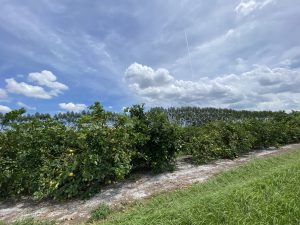FORT PIERCE, Fla.—The University of Florida’s Institute of Food and Agricultural Science’s Indian River Research and Education Center (UF/IFAS-IRREC) will host a field day in a large-scale research trial for growers and other citrus industry stakeholders to see firsthand. The

IRREC Millennium Block Variety Trial Field Day event will be held from 9 a.m. to 12 noon, Oct. 19. The Millennium Block is at 7850 Pruitt Research Road, Fort Pierce, Florida, within a couple of miles of the exits for Interstate 95 and the Florida Turnpike.
“Citrus growers from all of the state’s important regions can benefit from the findings that are now visible in the rootstock variety trials in IRREC’s Millennium Block,” said IRREC Center Director Ronald D. Cave. “The harvest this fall and winter will be the first for the four trials, and by late January, we should have the first data to share with growers.”
Those interested may register at the following online link https://www.eventbrite.com/e/millennium-block-field-day-tickets-416608355807. To register by email or telephone, call Tom James, IRREC biological scientist, at 772-468-3922 or email: hjames1@ufl.edu
The experimental grove was established in 2019 in response to a decline in Florida’s fruit production due to citrus greening, the most serious citrus disease worldwide. New rootstocks combined with tree scions, the aboveground part, are widely believed to identify combinations that will tolerate the disease, Cave said.
Cave leads the 20-acre citrus grove research program at the research center, in addition to his duties as director for the facility of more than 70 employees. As part of his work to oversee the center’s citrus research program, Cave supervises Tom James, a biological scientist who manages the trial grove.
James said the grove features more than 5,500 2- and 3-year-old trees. A total of 154 new citrus scion-rootstock combinations are the trees included in the active research project. Many trees bear fruit that will be harvested later this fall.
“We have a grapefruit scion trial with 18 selections on three commercial rootstocks and three independent rootstock trials with ‘Ray Ruby’ grapefruit, ‘Glenn 56-11’ navel orange, and ‘UF 950’ mandarin as scions,” said James.
Field day attendees will stop at tented information booths at the trial entrance. Researchers, graduate students, IRREC team members, and Extension professionals will respond to questions and provide printed maps and key plant growth data for each citrus variety under study.
“In each research trial, visitors can stop, look at each plot of five trees, and see which combinations perform best, visually identifying those they feel are the best performers,” James said.
Each experimental plot is identified by a code tag and replicated six times across the trial.
The Millennium Block is a trial to determine which scion and rootstock combinations can better adapt to the Indian River’s Flatwoods soils and tolerate citrus canker and citrus greening while producing profitable crops.
“The strategy that offers the most hope for Florida growers to keep citrus groves productive in the current citrus greening era is tree variety improvement,” said Cave.
UF/IFAS plant breeders Jude Grosser, Fred Gmitter and Bill Castle at the UF/IFAS Citrus Research and Education Center in Lake Alfred developed citrus varieties they expect will tolerate citrus greening, Cave said. Breeders Ed Stover and Kim Bowman with the U.S. Department of Agriculture Horticultural Research Laboratory in Ft. Pierce (USHRL) also contributed citrus varieties for the study.
Bill Castle, UF professor emeritus and Peter Spyke, a local grower, contributed to citrus variety selection for the project, along with Indian River Citrus League board members and the USHRL director and researchers.
“We are testing a wide variety of grapefruit scions and rootstocks available,” said Cave. “And early next year, we will provide growers with the first yield data from the experiment, and that’s key to science-based decisions that will help growers sustain the work they love,” Cave said.
 12
12
